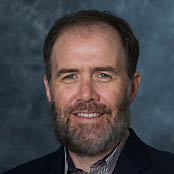Accounting professor Drew Newman tries to instill a sense of family into mentoring
Ph.D. accounting students. While he sets high academic expectations for them, he also
sets the bar high for his own level of support to help guide them through the program
and prepare them for careers in academia.
Fellow Moore School accounting professor Scott Vandervelde calls Newman’s relationship with Ph.D. students the “Drew Newman academic family.”
Newman “has had great success in guiding his Ph.D. students,” Vandervelde said.
Vandervelde noted three recent recognitions that can be attributed to Newman’s mentorship:
- While still in the Ph.D. program in 2018, alumnus Paul Black published “Performance Feedback Type and Employees' Subsequent Willingness to Help Other Employees” with his co-authors that included Newman in the Journal of Managerial Accounting Research; Black is now an assistant professor at Auburn University.
- In 2019, Ph.D. alumnus Nate Waddoups received the Emerging Scholar Best Paper Award and the Best Dissertation Award from the American Accounting Association; Waddoups is currently an assistant professor at the University of Denver.
- In 2021, current Ph.D. student Grazia Xiong, along with Newman and Waddoups, received a Best Paper Award from the American Accounting Association for “Does the effect of reward frequency on performance depend on reward type?”
Black, Waddoups and Xiong all agree that Newman took an interest in their overall well-being and learning, not just their research, while they were in the program.
While Black said he learned how to manage the academic research pipeline, Newman taught him other important skills.
“There are a lot of things that can bog students down in a Ph.D. program, but [Newman] helped me avoid a lot of them both through good advice and through the time and effort he put into helping me succeed,” Black said.
When it comes to the research publishing process, Newman said he teaches Ph.D. students how to develop and study interesting, unexplored research questions. He also encourages his students to embrace being a team player, since many scholars will frequently have co-authors.
“I really try to help students understand the value of building a multi-faceted skill set that helps them excel on each of these dimensions,” Newman said. “I have been fortunate that all of my Ph.D. students to date have bought in to this approach and continue to grow their skills in each of these dimensions even after graduation.”
Newman said teaching students how to take their underlying abilities and learn to apply them in new ways and directions — while also potentially experiencing some failures along the way — is key to gain confidence to be a scholar.
“Oftentimes, they will realize that whatever obstacles or challenges they were dealing with [in a previous semester] now do not seem so daunting,” he said. “My hope is that this helps them gain confidence in their abilities and appreciate how much they have learned and overcome, both of which should help when they encounter future challenges.”
Xiong credits Newman with improving her academic writing over the four years she’s completed so far in the Ph.D. program.
Newman’s “insights and feedback on my work have significantly improved my academic writing,” she said. “He is not only preparing me to be able to complete my dissertation but also to have a successful career as an academic. Newman has a great vision for research and does an excellent job in training me to perform high-quality research.”
While the Ph.D. coursework is rigorous, developing, executing and managing research projects tends to be the first major difficulty Ph.D. students face; the research and publishing process for scholarly research can be daunting, often taking years to develop a dissertation or academic paper, Newman said.
“Although [Newman] taught me an incredible amount about how to perform research, one of the best skills he taught me was how to manage the workload so I wouldn’t become overwhelmed,” Waddoups said. “His teachings have allowed me to stay productive without burning out.”
Recognizing when students may struggle within the program, Newman said his approach is to help provide a foundational knowledge for research and work as a sounding board to keep projects on track and to further instill a sense of confidence in the students’ abilities.
“One trick I’ve learned from my mentors to help me stay motivated is to create successes to celebrate. That is, every research project inevitably has a series of milestones,” Newman said.
Newman also treats his working relationships with Ph.D. students as reciprocal and part of a team effort.
“I learn a lot from my students — whether it be about new streams of research or cutting-edge statistical approaches to analyze data. Ultimately, the mentoring of any student is a collective effort,” he said. “My colleagues and I in the School of Accounting at the Moore School work very hard to develop a culture where Ph.D. students have the resources available that will create opportunities for them to thrive. A big part of that is an environment where students get guidance and mentorship from a variety of faculty members.”
Newman said he and his colleagues treat their Ph.D. students — who spend 5 years in the program — with an open-door policy that positions students as fellow colleagues.
“Having talked to colleagues who earned their Ph.D.s at various institutions, I’ve realized how blessed I was to end up at South Carolina,” Black said. “The faculty in accounting were incredibly supportive of their Ph.D. students and really tried to help us succeed. I’m very grateful I got to attend South Carolina.”
Xiong said she looks forward to continue networking with her fellow Ph.D. students and the faculty who have supported her during her time at USC and intends to maintain those invaluable networks throughout her career.
